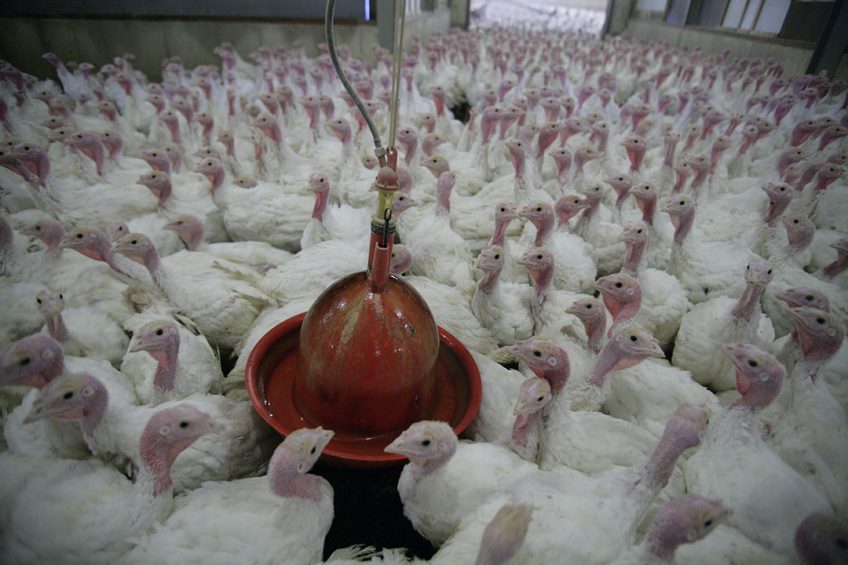US/UK antibiotic use in poultry examined

Antibiotic use in turkeys in the United States is about 9 times as high as the use in UK birds, while US chickens are given twice as much antibiotics as in the UK.
The figures, released by the pressure group Save our Antibiotics, come at a time when the UK’S decision to leave the European Union is likely to lead to significant increases in imports from nations, such as the US. Once the UK leaves the European Customs Union, the government is planning large cuts to tariffs on the import of meat from countries, like the US, with which it does not yet have a free trade deal covering agricultural goods, which will make many more imports more economic. Tariffs on poultry are to be cut by 40%. There is also concern that the UK government may choose to life the current EU bans on chlorine washed chicken meat.
Threat to UK poultry standards
The report, “Farm antibiotic use in the United States – A threat to UK standards?” said that British farm antibiotic use has been cut by 50% between 2014-18 due to voluntary action by farmers with the poultry sector ended preventative antibiotic use. The reductions in UK farm antibiotic use already appear to be contributing to reductions in antibiotic resistance in certain bacteria from British pigs and poultry, which is good news for human health.
US farmers continue to massively overuse antibiotics despite increasing warnings…” – Colin Nunan, Save our Antibiotics spokesman.
Citing figures from the British Poultry Council, which covers 90% of the UK poultry meat industry, the report says antibiotic use in chickens is now at around 12mg of active ingredient of antibiotic/kg of Population Correction Unit and 47mg/kg. US figures show antibiotic use at 25mg/kg in chickens and 426mg/kg in turkeys. This is in spite of the decision by the US chicken industry to follow consumer demands and move to “Antibiotic Free” chicken.
The report adds that differences in antibiotic use between the EU and the US could continue to grow in coming years due to the different approaches that are being taken to the routine use of antibiotics and their excessive preventative use.
 Antibiotic Reduction
Antibiotic Reduction
Moving away from antibiotics can be challenging and requires a new way of thinking, adapting feeding practices and biosecurity plans. This special edition explores the latest methods for raising healthy livestock without the use of preventive antibiotics.
The US is clear it wants to agree a trade deal with the UK based on minimum international animal-welfare and antibiotics standards.“- Colin Nunan.
Colin Nunan, Save our Antibiotics spokesman, said: “US farmers continue to massively overuse antibiotics despite increasing warnings about the threat this poses to human health. British consumers should be concerned if a UK-US trade deal results in increasing imports of US meat and dairy produced in this way, as we know that antibiotic-resistant bacteria can pass to humans through the food chain.
“The US is clear it wants to agree a trade deal with the UK based on minimum international animal-welfare and antibiotics standards. But if the UK government accepts this approach it risks reversing the progress that British farmers have made in reducing their antibiotic use. British farmers would have to compete with much cheaper production of meat and dairy from animals raised in very intensive conditions with far higher levels of antibiotic use.”
EU wants ban routine use of antibiotics in food animals
New EU legislation, coming into force on 28 January, 2022, will ban all routine farm antibiotic use including all preventative treatments of groups of animals. In contrast, the US strongly opposes attempts to end preventative group treatments. In 2017, the World Health Organisation (WHO), produced new guidelines on farm antibiotic use which recommended that the use of antibiotics for group prevention be ended. But the US Department of Agriculture (USDA) condemned the guidelines saying they were “not supported by sound science.”
US oppose EU ban on antiobitics
The US’s chief agricultural negotiator, Gregg Doud, has also strongly attacked the new EU legislation, saying the rules were essentially a ban on using antibiotics and were a “thinly veiled reason to create a trade barrier.” And the Animal Health Institute (AHI), the US trade body representing pharmaceutical companies that produce veterinary medicines, has also strongly opposed the EU legislation and indicate that if the UK adopts it, the measure could affect US/UK trade negotiations. The UK government says it plans to implement most of the EU measures on farm antibiotic use but has repeatedly failed to say whether it will ban preventative group treatments, saying it will consult with stakeholders, according to the report.













